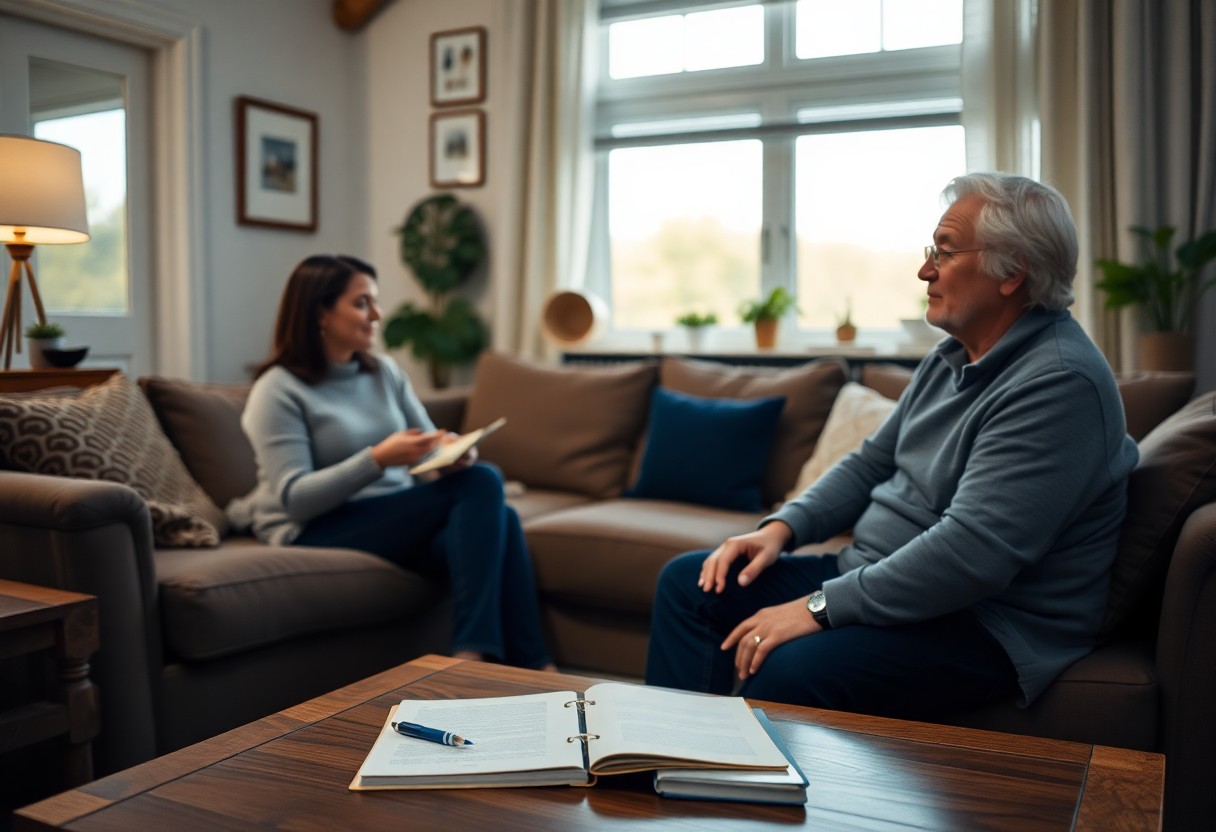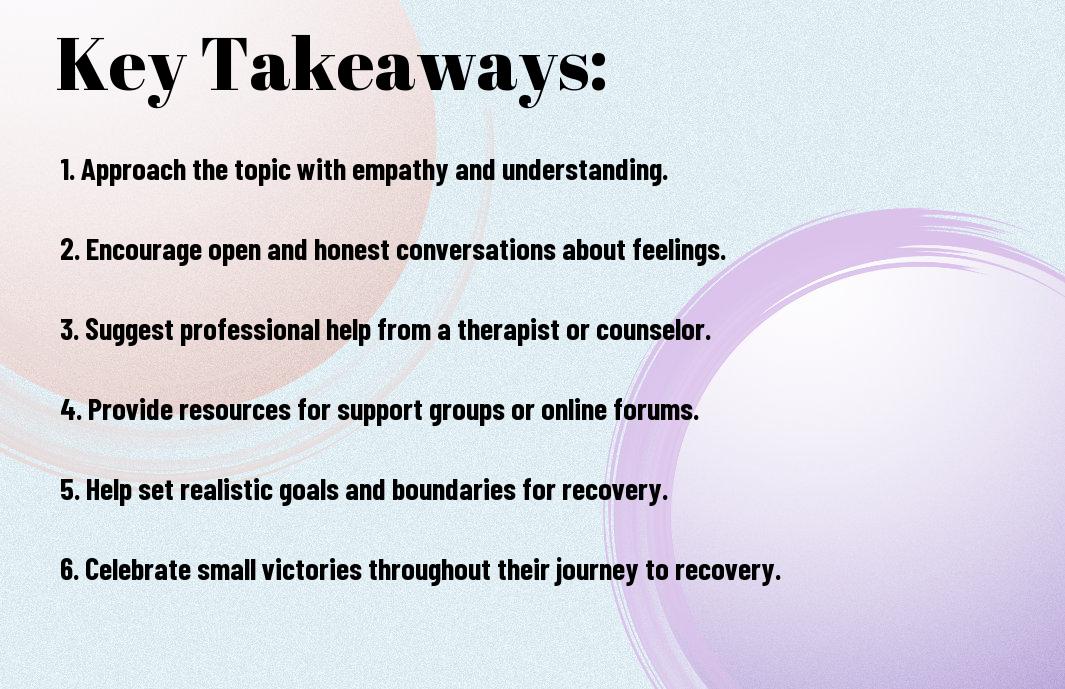It’s vital to approach the topic of porn addiction with sensitivity and understanding. If you suspect that someone in your life is struggling with this issue, you can play a pivotal role in their recovery. This quick support plan offers practical steps to provide the necessary support and encouragement. You can start by educating yourself on the challenges of pornography addiction, such as those outlined in this article on Pornography Addiction: Why Is Pornography Addictive?. By taking informed steps, you can empower your loved one on their journey to healing.

Key Takeaways:
- Encourage open communication to establish trust and provide a safe space for sharing feelings and struggles related to the addiction.
- Educate yourself and the individual about porn addiction to foster understanding and identify triggers for unhealthy behaviors.
- Help set realistic goals and encourage the individual to seek professional support, such as counseling or therapy if necessary.
- Support the development of healthier coping mechanisms, such as engaging in hobbies, exercise, or mindfulness practices, to replace the urge to use porn.
- Be patient and offer ongoing support, acknowledging progress and setbacks to encourage a positive and hopeful outlook on recovery.
Understanding Porn Addiction
For many, porn addiction can develop gradually, often starting as casual use that escalates into compulsive behaviors. This addiction is characterized by an inability to control or stop viewing porn, despite negative consequences in your personal or professional life. Recognizing the signs early on can lead to more effective support and recovery strategies.
Definition and Symptoms
One common definition of porn addiction is the compulsive consumption of pornography despite adverse effects on your relationships, self-esteem, or overall well-being. Symptoms may include increased time spent viewing porn, neglect of responsibilities, and feelings of anxiety or guilt after consumption.
Psychological and Emotional Impact
Before seeking to support someone with a porn addiction, it’s vital to understand the psychological and emotional repercussions it can have. The addiction can lead to feelings of shame, isolation, and depression, affecting not just the addicted individual but also their relationships and social interactions. This struggle often goes unnoticed, further compounding the emotional burden.
Emotional distress can manifest in various forms, including anxiety and feelings of inadequacy. The individual may feel trapped in a cycle of self-loathing after each binge, leading to an increased withdrawal from social connections and activities they once enjoyed. You might notice mood swings, irritability, or even aggression stemming from the shame related to their addiction. Being aware of these emotional challenges can guide you in providing compassionate support.

Creating a Supportive Environment
Some of the most effective ways to help someone with a porn addiction involve creating an atmosphere where they feel safe and understood. By fostering an environment that promotes healing and openness, you empower them to share their feelings and experiences without fear of judgment. This supportive setting can make it easier for them to confront their challenges and explore healthier coping mechanisms.
Open Communication
At the heart of a supportive environment is open communication. Encourage your loved one to express their thoughts and feelings freely, making it clear that you are there to listen. This dialogue can help you both address the addiction in a constructive manner and explore solutions together. Be patient, and let them guide the conversation at their own pace.
Establishing Trust
At the foundation of any supportive relationship lies trust. Building this trust requires you to be consistent in your actions and words, showing that you genuinely care about their well-being. Trust allows your loved one to be vulnerable without fearing rejection or anger, making it easier for them to discuss their struggles openly.
Also, be mindful of how you respond to their disclosures. Approach each conversation with empathy and understanding, and avoid shame or criticism. Validate their feelings and offer reassurance that they are not alone in their journey. Demonstrating that you can keep their confidences will further strengthen this bond, encouraging them to seek guidance from you when they need it most.
Encouraging Professional Help
Not everyone feels comfortable seeking help for their porn addiction, but encouraging your loved one to consult a professional can be a significant step in their recovery journey. By guiding them towards therapy or support groups, you empower them to explore their emotional triggers and develop coping strategies in a safe and supportive environment.
Therapy Options
To achieve lasting change, individual therapy can provide a tailored approach that addresses the specific challenges your loved one faces with their addiction. Techniques such as Cognitive Behavioral Therapy (CBT) help clients understand and reframe their thoughts and behaviors around pornography, fostering healthier attitudes and habits.
Support Groups
Among the numerous resources available, support groups offer a sense of community and shared experience, making recovery feel less isolating. These gatherings allow individuals to connect with others facing similar struggles and to share coping strategies, ultimately reinforcing accountability and motivation in the recovery process.
Groups often provide a non-judgmental space where participants can express their feelings and experiences. Through structured discussion and peer support, they learn valuable insights from one another. Many support groups are facilitated by trained professionals, guiding conversations around shame, triggers, and effective coping mechanisms, making collective recovery an empowering experience.
Providing Resources and Tools
Now, equipping yourself with the right resources and tools can significantly aid in supporting someone struggling with porn addiction. This includes educational materials that offer insights into the nature of addiction, coping mechanisms, and strategies for recovery. By providing access to reliable resources, you enable a greater understanding of the challenges at hand and reinforce the importance of seeking help.
Educational Materials
Resources such as books, articles, and online courses can prove invaluable in helping you understand porn addiction. Look for educational materials that cover the psychological impacts, scientific research, and testimonies from those who have overcome similar struggles. The more informed you are, the better you can support someone on their journey to recovery.
Digital Wellness Apps
For those looking for practical digital solutions, consider using apps designed to promote digital wellness. These tools can help monitor and limit screen time, set goals, and track progress in overcoming addictive behaviors related to pornography. By integrating these apps into your support strategy, you can provide structure and motivation for your loved one.
Apps dedicated to digital wellness often include features that allow users to block specific websites, limit usage times, and provide daily reminders for mindfulness or self-care. Some even offer community support and forums where users can share their experiences and coping strategies. By encouraging the use of these tools, you can help create a positive environment that fosters healing and personal growth.

Setting Boundaries
All relationships benefit from clear boundaries, especially when supporting someone with a porn addiction. Establishing limits can help you both navigate the complexities of their recovery. It’s important to communicate openly about what behaviors are acceptable and which ones are not, creating a safe environment for honest discussions. For more detailed guidance, consider exploring How to Help Someone with a Porn Addiction.
Healthy Limits
Beside setting limits, it’s vital to establish healthy expectations regarding your interactions. Make sure both of you understand what behaviors are supportive and what may hinder recovery. Encourage your loved one to take ownership of their journey while ensuring you maintain a dedication to your well-being as well.
Avoiding Triggers
Against the challenge of addiction, it’s important to minimize exposure to triggers that may lead to relapse. These could include certain environments or online content that might prompt the urge to view pornographic material. Establishing these boundaries will support the recovery process and help maintain focus on healthier habits.
Triggers can stem from various sources, including stressful situations, certain social settings, or even particular online spaces. Identifying these triggers allows you to work together on strategies to avoid them. Encourage your loved one to share their feelings about what tends to spark their urges, and collaboratively brainstorm alternatives that prioritize their recovery journey.
Supporting Recovery
Despite the difficulties that come with overcoming a porn addiction, your continued support can play an instrumental role in the recovery process. Engage in open dialogues, offer encouragement, and listen attentively to their concerns. Your presence can offer much-needed comfort and stability as they navigate the complex emotions involved in breaking free from addiction.
Celebrating Small Victories
Behind every step forward, even the smallest ones, lies a significant achievement. It’s important to acknowledge and celebrate these victories, whether they involve a single day of abstinence or a week without acting on urges. This recognition not only boosts morale but also reinforces their commitment to change, reminding them that progress is possible and worth celebrating.
Sustaining Long-Term Change
Behind the initial success in recovery lies a need for ongoing dedication and support. Sustaining long-term change requires building healthy habits and replacing old ones with positive activities. Encourage your loved one to engage in therapy, maintain a balanced lifestyle, and develop a strong support network. Just as recovery is a journey, so is maintaining the progress they’ve made.
And while the road to sustaining long-term change may be filled with challenges, reinforcing healthy habits can make a significant difference. Encourage your loved one to explore interests and activities that enrich their lives, such as exercise, mindfulness practices, or creative outlets. Establishing a routine can build resilience against potential setbacks, making it easier for them to stay committed to their journey. Your role in this process is vital—your support and understanding can help transform their path into one of lasting recovery and fulfillment.

Conclusion
To wrap up, supporting someone with a porn addiction requires understanding, compassion, and a structured approach. You can encourage open communication, help them find professional resources, and participate in support groups together. It’s necessary to foster a non-judgmental environment while setting healthy boundaries. By being patient and actively engaged in their recovery journey, you can make a significant difference in their path toward healing and personal growth.
FAQ
Q: What are some signs that someone may be struggling with a porn addiction?
A: Signs of porn addiction can vary from person to person, but common indicators include spending excessive amounts of time viewing pornography, neglecting responsibilities or relationships due to porn use, experiencing emotional distress or guilt related to their viewing habits, and having difficulty reducing or stopping porn use even when they want to. Observing changes in mood or behavior, such as increased secrecy or withdrawal from social activities, can also be telltale signs.
Q: How can I approach someone I suspect has a porn addiction?
A: Approaching someone about their addiction can be sensitive. It’s important to express concern without judgment. Choose a private and comfortable setting, and start the conversation by sharing your observations and feelings. Use “I” statements, such as “I’ve noticed you seem preoccupied lately,” to prevent them from feeling attacked. Encourage open communication and be prepared to listen without offering immediate solutions.
Q: What are effective ways to offer support to someone with a porn addiction?
A: Effective support can include being present and offering emotional reassurance. Encourage them to seek professional help, such as therapy or counseling focused on addictions. You can also suggest joining support groups where they can connect with others facing similar challenges. Additionally, help them identify triggers and develop strategies to avoid or cope with situations that lead to porn use.
Q: How can I help someone create a plan to reduce their porn usage?
A: To create a plan, start by discussing specific goals they want to achieve related to their porn use, such as reducing frequency or eliminating it altogether. Help them establish a timeline and daily or weekly self-check-ins. Encourage alternative activities that align with their interests to replace porn viewing. Journaling, exercise, or engaging in hobbies can be excellent substitutes. It may also be helpful to set boundaries around internet use and implement accountability measures.
Q: What resources are available for someone dealing with porn addiction?
A: There are various resources available, including professional counseling services specializing in addiction treatment. Online support groups and forums can also provide guidance and community support. Books and educational materials on addiction recovery can offer insights and strategies. Websites dedicated to addiction recovery may feature useful tools and tips as well. Directing them towards these resources shows support and encourages them to take actionable steps.
Q: How can the impact of pornography on relationships be addressed?
A: Open and honest communication is key when addressing the impact of pornography on relationships. Discuss how porn use may be affecting intimacy, trust, and connection. Encourage them to express their feelings and concerns, and listen actively. It may be beneficial to seek couple’s therapy, where both partners can explore their feelings and work together on rebuilding trust and intimacy. This process can help both parties understand the underlying issues and improve their connection.
Q: What should I do if my support is not helping the person with a porn addiction?
A: If your support doesn’t seem to be making a difference, it’s important to take care of your own well-being as well. Encourage the individual to seek professional assistance if they haven’t already done so. Reiterate your willingness to help and be there for them but recognize that ultimately, they need to be ready to make changes. Additionally, consider setting boundaries to protect your emotional health, if needed, while continuing to offer support from a distance.







